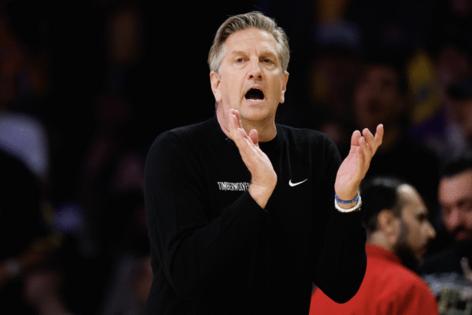Jim Souhan: 'In Finchy we trust' a true calling card for the Timberwolves
Published in Basketball
MINNEAPOLIS — You didn’t have to engage in many conversations in the vicinity of First Avenue and North 6th Street this winter to hear a certain refrain.
I heard it from two Minnesota Timberwolves team broadcasters, one team executive and one team staffer. I never heard a player use these exact words, but they did echo the sentiment.
The phrase: “In Finchy we trust.”
For the second time in three years, Timberwolves President of Basketball Operations Tim Connelly upended a winning team with a blockbuster summer trade.
Two years after trading a slew of players and draft picks for the awkward-but-effective Rudy Gobert, and right before training camp was to begin, Connelly traded star forward Karl-Anthony Towns to the Knicks for Julius Randle, Donte DiVincenzo and other assets.
For the second time in three years, Connelly essentially told coach Chris Finch, “All that continuity you were building? Sorry, pal. Start over with a key player who will require time to adapt, and who will be unpopular with the fan base. Good luck. I’ll stay out the way, not doing interviews or answering questions during the season, so you get to deal with all the grief.”
We can see a pattern developing. Connelly makes the big deal, angers the fan base and relies on Finch to figure it all out.
Then Finch does.
Gobert looked lost in Minnesota in his first season. In his second season, he played a key role in the team advancing to the Western Conference finals.
This season, Randle looked like a misfit in the Wolves offense until he returned from an injury at the beginning of March.
Since then, the Wolves are 21-5, including their 4-1 series victory over the Los Angeles Lakers in the first round of the playoffs.
Wednesday night, in the clinching victory, Randle and Gobert were the Wolves’ best players.
They aren’t the only players who have gotten better while playing for Finch.
Jaden McDaniels’ play was so poor earlier this season that you could have questioned whether he was worthy of his long-term contract. He wasn’t shooting or rebounding well.
In the first 23 games of the season, he had zero games with eight or more rebounds. In the final 59 games, he had 25 games with eight or more rebounds.
He averaged 9.6 points through the end of December. He averaged 13.9 points the rest of the way.
Through four games of the Lakers series, Gobert scored a total of 14 points against a weak frontcourt. In Game 5, ol’ fumble fingers had perhaps the game of his life, leading the Wolves with 27 points, 24 rebounds, two blocks and zero turnovers.
There were times this year when Anthony Edwards looked lost; DiVincenzo looked homesick; Mike Conley looked old. Finch stuck with all of them, displaying the kind of patience that is rarely seen in modern professional sports.
Then he out-coached supposed wunderkind JJ Redick, who, in desperation, overplayed his stars and, in an unFinchian move, gave up on starting center Jaxson Hayes and his bench.
The result: The Wolves didn’t even have to play or shoot particularly well to run away with the series.
With the victory over the Lakers, Finch authored the best two-year playoff stretch in franchise history. Never before had the Wolves won three playoff series in two seasons. And each of those playoff victories came against superstars — the Suns’ Kevin Durant and Devin Booker, the Nuggets’ Nikola Jokic and Jamal Murray and the Lakers’ Luka Doncic and LeBron James.
One season after Doncic shredded and taunted the Wolves in a five-game playoff victory, the Wolves made Doncic look tired and fragile. He averaged 30.2 points per game, but had to work hard to get his shot off and looked either exhausted or indifferent on defense, which is why Finch had his ballhandlers attack Doncic constantly.
With Connelly’s shrewd maneuvers and Finch’s patient teaching, the Wolves have developed an eight-man rotation that can beat you with size, defense, 3-point shooting (their horrid Game 5 performance notwithstanding), paint points, rebounding and toughness.
Their players, including Edwards, don’t take games off to rest. They share the ball, and there have been no moments in the last three seasons where the players sounded unsure about their coach.
Finch has been able to coach his players hard, to ask them to adapt their games to serve the team, and has done it all with a wry sense of humor and a distinct lack of ego.
So: In Finchy they trust.
____
©2025 The Minnesota Star Tribune. Visit at startribune.com. Distributed by Tribune Content Agency, LLC.







Comments